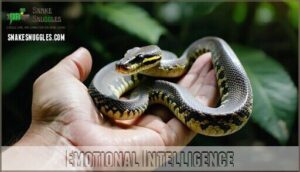This site is supported by our readers. We may earn a commission, at no cost to you, if you purchase through links.
 You might think snakes are just simple creatures, but they’re actually smarter than you’d expect. Research shows snakes can solve puzzles, remember hunting routes for months, and even recognize individual humans.
You might think snakes are just simple creatures, but they’re actually smarter than you’d expect. Research shows snakes can solve puzzles, remember hunting routes for months, and even recognize individual humans.
They demonstrate spatial intelligence comparable to birds, using complex problem-solving skills to navigate mazes and adapt their hunting strategies. Ball pythons can distinguish between different people, while rattlesnakes learn to avoid dangerous situations through experience.
Their brains efficiently process sensory information to make calculated decisions about energy use and risk assessment. When you consider how intelligent are snakes, you’re looking at reptiles with surprising cognitive abilities that challenge common misconceptions about their mental capacity.
Table Of Contents
- Key Takeaways
- How Intelligent Are Snakes?
- Snake Intelligence Overview
- Cognitive Abilities
- Emotional Intelligence
- Sensory Perception
- Social Behavior
- Bonding and Affection
- Implications for Human Understanding
- Frequently Asked Questions (FAQs)
- Do snakes have intelligence?
- What is the most intelligent snake?
- Are snakes smart?
- Are snakes intelligent reptiles?
- Are snakes smarter than dogs?
- How do you know if a snake is intelligent?
- Are snakes highly intelligent?
- Are snakes smart enough to open doors?
- Are snakes capable of loving you?
- Do snakes recognize their owners?
- Conclusion
Key Takeaways
- You’ll find snakes possess genuine problem-solving abilities that go beyond basic instincts – they can navigate mazes, remember hunting routes for months, and adapt their strategies based on experience.
- Your pet snake can actually recognize you as an individual through scent and develop trust over time, showing reduced defensive behavior and increased comfort around familiar handlers.
- You’re looking at reptiles with impressive spatial intelligence comparable to birds – they can form mental maps of their environment, remember escape routes, and even learn to distinguish between different people.
- You shouldn’t underestimate their cognitive abilities since research shows snakes can solve puzzles, demonstrate memory retention up to eight months, and challenge our assumptions about what "cold-blooded" creatures can accomplish mentally.
How Intelligent Are Snakes?
Think snakes are just simple, instinct-driven creatures? You’ll be amazed at their actual snake intelligence. These reptiles possess genuine problem-solving abilities that challenge everything we thought we knew about reptile cognition.
Their snake IQ includes recognizing individual humans, forming basic concepts, and demonstrating impressive learning capacity. Research reveals snakes’ brain structure supports complex behaviors beyond basic survival instincts.
They show remarkable adaptability, adjusting hunting techniques and traversing new environments with surprising skill. Animal intelligence studies now recognize that reptile intelligence extends far beyond previous assumptions. Snakes use their olfactory capabilities to identify surroundings.
From remembering escape routes to distinguishing between different people, snakes exhibit snake cognition that’s both fascinating and unexpected. While they’re not solving calculus problems, their mental abilities are more sophisticated than most people realize.
These discoveries are rewriting our understanding of how smart cold-blooded creatures can actually be.
Snake Intelligence Overview
You’ve probably heard snakes described as "cold-blooded" creatures driven purely by instinct, but modern snake intelligence research paints a completely different picture.
Scientists are discovering that these reptiles possess remarkable cognitive abilities that challenge our understanding of reptile intelligence and animal intelligence overall.
Defining Intelligence in snakes requires looking beyond traditional mammalian-based testing methods.
Their unique Brain Structure processes information differently than mammals, yet they demonstrate clear problem-solving skills.
Current Testing Methods have revealed impressive snake cognition abilities that researchers previously overlooked.
Here’s what makes snake behavior so fascinating:
- They can learn new behaviors through individual experiences
- Problem-solving skills help them navigate complex environments
- Memory formation allows them to recognize familiar humans
- Adaptive responses show they’re not just following genetic programming
From an Evolutionary Perspective, snakes developed specialized intelligence suited to their ecological needs.
Protecting yourself requires snake safety precautions when in snake habitats.
Future Research into snake intelligence could reveal breakthroughs in treating human neurodegenerative diseases, making these studies more important than ever imagined.
Cognitive Abilities
Snakes possess remarkable cognitive abilities that’ll change how you think about these fascinating reptiles. Problem solving comes naturally to many species – they can navigate mazes, remove obstacles with their teeth, and find escape routes that would stump other animals.
Spatial learning is particularly impressive in corn snakes, which can reduce puzzle-solving time from eleven minutes to just thirty seconds through practice. Memory retention plays a vital role in snake intelligence. These reptiles remember hiding spots, recognize individual humans by scent, and recall successful hunting locations.
Adaptive behavior shows up when snakes modify their responses based on new experiences rather than relying solely on instinct. Conceptualization abilities emerge through their capacity to form simple associations and recognize patterns. Young snakes demonstrate exceptional resourcefulness when finding creative solutions to environmental challenges.
While reptile intelligence differs from mammalian cognition, animal cognition research reveals that snake learning involves complex neural processing. Their snake problem solving skills challenge old assumptions about what these remarkable creatures can accomplish mentally. Enriched environments are essential as they enhance a snake’s problem-solving abilities.
Emotional Intelligence
Beyond their reputation as cold-blooded hunters, you’ll discover that snakes possess surprising emotional intelligence that shapes their daily interactions.
Research reveals these reptiles demonstrate individual temperament differences and can form emotional connections with familiar handlers. Their emotional capacity includes recognizing threats and sensing danger through sophisticated behavioral adaptation. Reptiles, in fact, have a surprising emotional capacity that has been confirmed through studies.
Consider these fascinating emotional abilities:
- Social learning – Some species maintain connections beyond mating seasons
- Stress responses – They show distinct reactions to environmental changes.
This animal cognition challenges our understanding of reptile behavior and snake intelligence.
Sensory Perception
Your perception of snake senses might surprise you.
These reptiles possess extraordinary sensory perception abilities that go far beyond basic sight.
Their forked tongues constantly collect chemical signals from the environment through chemoreception.
Many species have infrared vision that detects heat signatures, while their vibration sensitivity picks up ground movements from considerable distances.
Some snakes even demonstrate electroreception and magnetic sense capabilities.
This sophisticated reptile senses system creates detailed environmental maps, enabling precise hunting and navigation even in complete darkness through snake awareness.
Snakes use their forked tongues to sample chemical gradients for directional tracking.
Social Behavior
Recent research reveals that many snake species exhibit fascinating social behavior that challenges old assumptions.
You’ll find snakes engaging in Group Hunting, with Cuban Boas coordinating prey capture together. They demonstrate Owner Recognition through scent identification and show Social Learning by observing group behaviors.
Urban Adaptation showcases their snake social dynamics as they navigate human environments. Even Venom Control involves snake communication – deciding when to deliver dry bites versus full envenomation.
Here’s what makes reptile social behavior remarkable:
- Rattlesnakes form winter den communities with hundreds of individuals
- King cobras build and guard communal nests together
- Garter snakes create complex social networks based on age and sex
- Some species prefer joining larger groups for protection
- Individual personalities influence their social interaction choices
Snakes also use chemical signals for mating.
Bonding and Affection
Your pet snake won’t fetch your slippers, but Owner Recognition develops through scent and consistent Human Interaction.
Watch for Affection Signs like approaching you for warmth or rubbing against your hand. Trust Building happens gradually through gentle handling sessions.
While Snake Companionship differs from mammalian pets, snake intelligence allows them to distinguish familiar people from strangers. Their snake behavior shows snake cognition through reduced defensive responses around trusted handlers.
Snake social behavior includes seeking security from owners, and snake communication occurs through body language rather than vocalizations.
To guarantee comfort, always support snake bodies fully during handling.
Implications for Human Understanding
Snake intelligence research offers surprising insights that could revolutionize your understanding of human cognition. Scientists studying reptilian cognition have discovered connections between snake learning patterns and our own brain functions that might blow your mind.
Snakes aren’t just surviving on instinct—they’re actively learning, adapting, and challenging everything we thought we knew about intelligence.
Here’s how snake intelligence research impacts human understanding:
- Neurogenesis research: Snakes produce new brain cells throughout their lives, unlike humans. This discovery could facilitate treatments for Alzheimer’s and brain injuries by showing us how continuous neuron generation works.
- Medical advancements: Snake brain plasticity research helps scientists understand how human brains adapt after trauma. Your brain’s ability to rewire itself mirrors what researchers observe in adaptable snake species.
- Evolutionary insights: Studying animal cognition in snakes reveals how intelligence evolved differently across species.
Snakes recognize humans through smell and taste, associating them with care. These findings challenge cognitive biases about "primitive" reptiles and support conservation efforts by demonstrating that snake cognition deserves respect and protection in our ecosystems.
Frequently Asked Questions (FAQs)
Do snakes have intelligence?
Yes, you’ll find snakes possess genuine intelligence beyond basic instincts.
They solve problems, recognize individual humans, learn from experience, and adapt behaviors.
Think spatial learning, social recognition, and clever escape artistry—not just hardwired responses.
What is the most intelligent snake?
Like a crown jewel among serpents, the King Cobra reigns supreme in snake intelligence.
You’ll find they’re nature’s master builders, constructing elaborate nests and displaying purposeful hunting behaviors that’ll make you rethink reptilian smarts.
Are snakes smart?
You’ll find snakes demonstrate surprising intelligence through problem-solving, recognizing handlers, and adapting behaviors. They’re not geniuses, but they’re cleverer than most people think, showing learning abilities that challenge old assumptions.
Are snakes intelligent reptiles?
While they’re not exactly Einstein’s relatives, you’ll find these scaly creatures possess surprising cognitive abilities.
They solve problems, recognize faces, adapt to environments, and even learn from experience—making them cleverer than most people assume.
Are snakes smarter than dogs?
No, you’ll find snakes aren’t smarter than dogs.
While snakes show problem-solving skills and can recognize handlers, dogs display superior intelligence through complex social behaviors, advanced learning abilities, and emotional intelligence that snakes simply can’t match.
How do you know if a snake is intelligent?
You’ll notice intelligent snakes solving problems faster over time, recognizing their handlers, adapting hunting strategies, and showing curiosity about new environments.
They’ll also demonstrate memory retention and modify behaviors based on past experiences.
Are snakes highly intelligent?
Snakes aren’t highly intelligent compared to mammals or birds, but they’re smarter than you’d expect.
They solve problems, recognize owners, adapt to new environments, and learn from experience—showing surprising cognitive abilities, such as problem-solving.
Are snakes smart enough to open doors?
Don’t hold your breath waiting for snakes to turn doorknobs.
They lack opposable thumbs and can’t grasp handles.
However, they’re excellent escape artists who’ll squeeze through gaps you’d never imagine possible.
Are snakes capable of loving you?
While snakes can’t love you like dogs do, they’ll recognize your scent and learn you’re safe.
They might seem comfortable around you, but it’s more about trust and familiarity than actual affection.
Do snakes recognize their owners?
Like a familiar tune, your scent becomes music to their senses.
Yes, snakes recognize you through smell and vibration patterns.
They’ll respond differently to familiar handlers, showing less defensive behavior and more curiosity around trusted caregivers.
Conclusion
Research reveals that snakes can remember specific hunting locations for up to eight months, demonstrating remarkable long-term memory capabilities.
You’ve discovered that these reptiles possess cognitive abilities far beyond basic survival instincts.
From spatial navigation to individual recognition, snakes challenge our assumptions about reptilian intelligence.
Understanding how intelligent are snakes helps us appreciate their complex behaviors and decision-making processes.
Next time you encounter a snake, you’ll recognize you’re observing a surprisingly sophisticated creature with genuine problem-solving skills.
- https://snakesplash.com/what-a-snakes-behavior-reveals-about-its-intelligence-1-3533/
- https://rattlesnakehq.com/are-snakes-intelligent/
- https://freescience.info/animal-cognition-intelligence-and-problem-solving/
- https://adaintymum.blog/snakes-intelligence-mammals-reptiles/
- https://www.berrypatchfarms.net/smartest-snakes/











